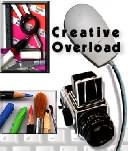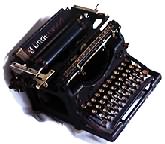|
|
|
Posture |
|
|
|
|
Understanding Copy
 Most of us read without questioning the writing process. Likewise, we are so accustomed to a finished brochure or piece of advertising, we seldom consider how the project is put together. Until, that is, we decide to advance our own business. Then we wonder where to begin and how to find the talent we need to promote our trade.
Most of us read without questioning the writing process. Likewise, we are so accustomed to a finished brochure or piece of advertising, we seldom consider how the project is put together. Until, that is, we decide to advance our own business. Then we wonder where to begin and how to find the talent we need to promote our trade.So where do you start? First, it is important to remember that most marketing projects begin with the written word. With the exception of some design driven assignments, composing the text or putting a concept into words is the starting point of the creative process. And, simplicity is the secret.
This is important to know because the writer helps define the character of your project. If your project is copy intensive, like a newsletter, the designer will work within text based parameters. If the copy is sparse, the design element may be more pronounced. However, when your message is delivered, it should say what you want it to say clearly, and in easy to read terms. Keeping the written word simple is an art.
 Second, be mindful that the term "writer" covers a vast territory. A trade publication for writers, The Writer's Market, lists many categories of writers. One section relates to advertising and copywriting. Another tells about audiovisuals and electronic communications. A third category is business and technical writing. Other areas include journalism, and public relations. There are more than 160 different kinds of writing projects mentioned in these categories alone!
Second, be mindful that the term "writer" covers a vast territory. A trade publication for writers, The Writer's Market, lists many categories of writers. One section relates to advertising and copywriting. Another tells about audiovisuals and electronic communications. A third category is business and technical writing. Other areas include journalism, and public relations. There are more than 160 different kinds of writing projects mentioned in these categories alone!While it is important to realize the many categories of writers, finding the right one shouldn't be difficult. This is especially true if you define your project and select a medium to carry your message beforehand. The medium you select usually helps determine the kind of writer you'll need. Are you creating a video? Are you creating an annual report? A laptop computer presentation? An advertising campaign? Keep in mind that the text relates to a style of writing as well as a specific application. Depending on the scope of the assignment, it is not uncommon for several different kinds of writers to be involved in a single project.
Since no one writer covers all the many communication variations, it helps to envision what kind of writing will best serve your needs. For example, I am writing this as journalistic copy because editorial writing is what I do best. Can I write advertising copy, or tag lines? I have, but I'm not very good. In fact, if I were judging my own performance in that area, I'd have to fire myself after the first day on the job. Experienced writers know their own strengths.
Composing ad copy, known as copywriting, differs markedly from journalism. In the former, you develop a concept using a few select words to convey a message. Yet, although ad copy and editorial text both require writing skills, each category requires different aptitudes. Copywriters are promotionally oriented. Whereas many copywriters started their careers in areas related to journalism, few journalists write ad copy well. In journalism, writing headlines most approximates a copywriter's job. In that media, the reporter doesn't usually write headlines, a copy editor does.
Beyond skills and aptitudes, you should consider the purpose of your project. Is your purpose promotional or informative? Some journalists can write promotional text but elect not to do so. This is because writing promotional copy may be viewed as violating ethics specific to their profession. Journalists pride themselves on being objective. Promotional copy is written with a bias toward a product or service. If the purpose of your project is to inform, you may prefer someone who writes in a journalistic style. If persuasion is the purpose of your project, then you want a promotional writer.
There are also writers for the spoken word. Broadcast, news copy and writers composing other oral presentations write for the ear. Their text is written to read aloud, almost like poetry. The paragraph structure, sentence length, rhythm and choice of words are different from what customarily appears in print.
By now, you are probably wondering how to differentiate between good and bad writers. Although writing is subjective, there are some practical guidelines. First, remember that language is fluid and changes with time. A good writer keeps up with these changes in vernacular and style. Second, consider your topic and subject matter. While a good generalist can usually cover a wide variety of topics, try to select someone who has experience reaching the audience your project is intended for. Why wouldn't you hire an ad copywriter to compose an annual report? Because a copywriter doesn't usually write in the language of the audience that reads an annual report.
Finally, take time to review work samples. Notice how the writer uses language, how he/she describes the subject matter or creates an idea. Is the copy stale or dry? Does it have punch? Should it have punch? Again, consider your audience and purpose.
There are also cost factors to consider. Writing is more than putting words on paper. If you hire a copywriter, you expect that person to also develop a creative concept. And, you pay for that concept. If your writer composes informational copy, research is usually involved. Since billable hours include research, be as organized as possible when presenting informational material. Whether a writer must understand an entire process or become acquainted with your corporate climate to complete a project, the time devoted to learning about your company or product is charged to you.
Two final comments about the bottom line. Nowadays, e-mail is standard. Use the technology to make changes, it is not usually necessary to schedule personal meetings every time a you make a copy change. Also, most writers charge for author's alterations after approval of the final copy. Please make sure everyone involved in the project reads the material before you sign off on it.
Now that we've touched upon the basics, let's review some essentials.
Rule #1. Composing text or putting a concept into words is the beginning of the creative process.
Rule #2. The medium you select usually helps determine the kind of writer you'll need.
Rule #3. Experienced writers know the style of writing in which they excel.
Rule #4. Most writers are stronger in one area than another.
Rule #5. Language is fluid and changes with time. A good writer keeps up with changes in vernacular and style.
Finally, consider an overlooked factor: style. Style refers to the character of writing, the feel of your piece. Is your piece humorous, lighthearted, heavy tech? Are you imparting facts and information? Keep your audience and application in mind when selecting a writer: whimsical differs from frivolous, reducing the complicated to simple is a feat. Make sure the style suits your needs. The successful advancement of your business is, in part, determined by the message you create.